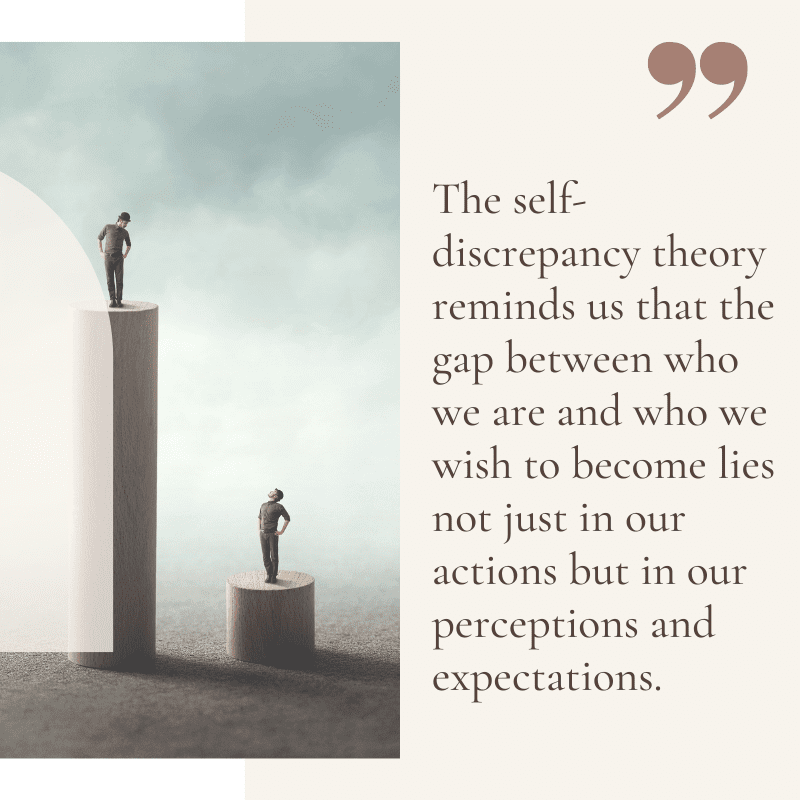Last Updated on October 8, 2024 by Subject Of Life
If you are hard on yourself, compare yourself, or feel like you are not good enough, the self-discrepancy theory is something that can really help you understand the tricky nature of how we see ourselves and the inner struggles we might face. This theory focuses on how we have thoughts and expectations about who we are right now and who we’d like to be and how sometimes, these don’t match up with our reality. It also highlights our natural urge to try and close the gap between who we are at the moment and who we hope or feel we should be.
The 3 Main Versions of Self

The actual self is all about qualities that you think you have or others see in you. For instance, someone might view their actual self as being hardworking and dedicated because they complete tasks consistently and take pride in a job well done. This perception could be reinforced by colleagues or friends who admire their work ethic and commitment, validating their self-assessment.
On the other hand, the ideal self includes all the traits that you or others wish you had. For instance, an individual might see their ideal self as being more adventurous and outgoing, envisioning themselves traveling to new places and meeting diverse groups of people. They might aspire to be the type of person who easily strikes up conversations with strangers and embraces new experiences without hesitation, differentiating their current, more reserved demeanor from the person they hope to become.
Then there’s the ought self, which includes the characteristics you or others feel you should have. For instance, an individual might view their ought self as being more responsible and organized, frequently reminding themselves to stay on top of deadlines and maintain a tidy living space. They may feel pressure from their family to uphold these standards, believing that by achieving this sense of responsibility, they will fulfill their role as a reliable and dependable person.
How To Recognize Self-Discrepancy In Yourself
Recognizing self-discrepancy within yourself often involves paying attention to feelings and behaviors that highlight misalignment between your actual, ideal, and ought selves.
A common sign is experiencing persistent feelings of dissatisfaction or inadequacy, even when you achieve your goals. This may suggest that your actual self doesn’t align with your ideal self, prompting you to set unrealistic standards.
Additionally, feelings of anxiety or guilt can occur when your actions or attributes deviate from what you believe you ought to do or be.
Behavioral signs include procrastination or resistance to change, as these may point to fear of not living up to your self-imposed standards.
Some things you may find yourself saying include:
- “I’m never good enough, no matter how much I achieve.”
- “Why can’t I just be more like the person I want to be?”
- “I feel guilty when I don’t meet all my own expectations.”
- “Everyone else seems to have it all together, why don’t I?”
- “I should be doing more with my life than I am right now.”
- “I’m constantly letting myself down by not reaching my ideals.”
- “I feel stressed when I think about how far I am from my goals.”
- “It’s hard to be happy with myself because I don’t measure up.”
How To Recognize Self-Discrepancy In Others
Observing self-discrepancy in others, while more challenging than recognizing it in oneself, can often be key in fostering understanding and support. It is important to pay attention to certain behaviors and expressions that may indicate internal conflict between an individual’s actual, ideal, and ought selves.
For example, if someone frequently expresses dissatisfaction with their accomplishments or seems hesitant to celebrate personal milestones, it may be a sign of a disconnect between their actual achievements and their ideal expectations.
Additionally, individuals might exhibit anxiety or guilt when discussing personal decisions, signaling a divergence from what they perceive as their ought self.
Understanding these cues is vital as it allows for more empathetic interactions, enabling us to provide support and guidance that respects their experience. Recognizing self-discrepancy in others is not about labeling, but rather about creating opportunities for open dialogue and assisting them on their journey towards self-acceptance and personal alignment.
How Can Self-Discrepancy Play A Role In Your Life?
Following are 10 examples of how you may find self-discrepancy playing a role in your life. Each of these examples demonstrates a discrepancy between the person’s actual self (their current behaviors or traits) and either their ideal self (the version of themselves they aspire to be) or their ought self (the version of themselves that they feel pressured to be by societal norms or expectations). This discrepancy can cause feelings of dissatisfaction, frustration, and even shame.
- A person who sees themselves as confident and outgoing, but is often too anxious to speak up in social situations.
- Someone who believes they should be successful and ambitious, but constantly procrastinates and underperforms in their career.
- A person who wants to be perceived as kind and empathetic, but often finds themselves getting angry and lashing out at others.
- Someone who values physical fitness and thinks they should have a healthy lifestyle, but struggles with consistent exercise and healthy eating habits.
- A person who desires strong, meaningful relationships, but has difficulty connecting with others due to trust issues or fear of vulnerability.
- Someone who wants to be seen as organized and responsible, but often forgets important tasks and misses deadlines.
- A person who values creativity and artistic expression, but feels pressured to conform to societal expectations of a more practical career.
- Someone who believes they should have a positive attitude and be optimistic, but constantly falls into negative thought patterns and pessimism.
- A person who wants to be seen as financially successful, but struggles with managing their money effectively.
- Someone who values intelligence and academic achievement, but feels inadequate compared to their peers and constantly doubts their abilities.
How Can Self-Discrepancy Affect Various Areas Of Your Life?
- Emotions: Self-discrepancy can lead to heightened feelings of anxiety, depression, and dissatisfaction as individuals struggle with the gap between their actual and desired selves.
- Relationships: It may cause interpersonal problems, as individuals may project their insecurities onto others, leading to misunderstandings or conflicts in personal and professional relationships.
- Health: Chronic stress from self-discrepancy can result in both mental and physical health issues, including burnout, fatigue, and stress-related illnesses.
- Spirituality: Individuals may experience a crisis of faith or spiritual doubt if their perceived self does not align with their spiritual or ethical beliefs.
- Work and Career: The discrepancy can affect job performance and satisfaction, as individuals may feel unfulfilled or unworthy in their professional roles.
- Self-Esteem: Self-discrepancy often undermines self-confidence and self-worth, making it challenging to pursue goals or take on new challenges.
- Personal Growth: While it can be a source of motivation to improve, excessive self-discrepancy may hinder personal development by fostering a fear of failure or change.
How Can We Work On Diminishing Self-Discrepancy And Focusing On Our Actual Self?
- Identify the areas of discrepancy: The first step in addressing self-discrepancy is to identify where it exists. Take some time to reflect on your beliefs, values, and expectations for yourself in various aspects of life (e.g. career, relationships, personal growth). Then, compare that with your current behaviors and traits in those areas. Where do you see a gap between your desired self and actual self? Furthermore, look at what you think you ought to be doing (or others think you ought to be doing) and compare it to what you are actually doing. This will help you pinpoint the specific areas of self-discrepancy that need attention.
- Understand the root causes: Once you have identified the areas of discrepancy, try to understand why they exist. Is it due to societal pressure? Past experiences or traumas? Perfectionism? Understanding the underlying reasons can help us address them more effectively.
- Practice self-compassion: It’s important to be kind and understanding towards ourselves as we work on diminishing the gap between our actual and desired selves. Instead of criticizing or shaming ourselves for not being “good enough”, we can practice self-compassion and remind ourselves that it’s okay to make mistakes and have flaws.
Habits like gratitude can help us appreciate and accept our current selves while still striving for improvement. Other habits that you might want to adopt include: mindfulness, positive self-talk, and self-care.
10 Affirmations To Help With Self-Discrepancy Issues
The following affirmations can be used often to help change the way we think about ourselves and bridge the gap between our actual and desired selves:
- “I am worthy and deserving of love and acceptance just as I am.”
- “My imperfections do not define me, they make me unique and human.”
- “I trust in my ability to grow and improve over time.”
- “I release the need for perfection and embrace my authentic self.”
- “I am enough, exactly as I am in this moment.”
- “I choose to focus on progress rather than perfection.”
- “I let go of comparing myself to others and honor my own journey.”
- “My worth is not determined by external validation or societal expectations.”
- “I forgive myself for past mistakes and choose to learn from them.”
- “I am confident in my abilities and trust in my own decisions.”
Just the awareness that you feel bad because there is a gap between your actual self and your ideal self or the self you think you ought to be is a huge step towards self-acceptance and growth. It shows that you have the desire to improve and be better, but it helps you become aware of unrealistic expectations or societal pressures that may be causing you to feel inadequate.





